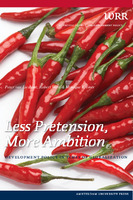Less Pretension, More Ambition
Development Policy in Times of Globalization
| dc.contributor.author | Lieshout, van, Peter | |
| dc.contributor.author | Went, Robert | |
| dc.contributor.author | Kremer, Monique | |
| dc.date.accessioned | 2011-12-31 23:55:55 | |
| dc.date.accessioned | 2019-12-10 14:46:32 | |
| dc.date.accessioned | 2020-04-01T15:22:56Z | |
| dc.date.available | 2020-04-01T15:22:56Z | |
| dc.date.issued | 2010 | |
| dc.identifier | 373632 | |
| dc.identifier | OCN: 700706904 | en_US |
| dc.identifier.uri | http://library.oapen.org/handle/20.500.12657/34678 | |
| dc.description.abstract | Development aid has become the subject of much discussion. Why do we give aid, and does it help? What do we know about the development paths being taken by various countries, or the possibilities of helping them to achieve their goals from outside? How relevant is development aid now that remittances and foreign direct investments have increased as a result of globalization? When does aid have more negative than positive effects? What is the significance of shifting power relations in the world? And do policies focusing on issues like climate, migration, financial stability, knowledge, trade and security not have a greater impact than aid on the development opportunities of poor countries? These questions inspired the Dutch Scientific Council for Government Policy (wrr) to examine what form development aid should take in the era of globalization. At the start of 2010, on the basis of over 500 interviews with experts and an extensive literature survey, the wrr presented its far-reaching recommendations. In October 2010, the new Dutch government decided to use the report as the basis of a thorough modernization of its development policy. This book is based on the wrr report. It builds on the many responses to the report, resulting in more elaboration on specific lines of reasoning, coverage of new themes and more comprehensive analyses, without changing the core of the original report. | |
| dc.language | English | |
| dc.relation.ispartofseries | WRR | |
| dc.subject.classification | thema EDItEUR::J Society and Social Sciences::JP Politics and government | en_US |
| dc.subject.other | public administration | |
| dc.subject.other | bestuurskunde | |
| dc.subject.other | political science | |
| dc.subject.other | politicologie | |
| dc.title | Less Pretension, More Ambition | |
| dc.title.alternative | Development Policy in Times of Globalization | |
| dc.type | book | |
| oapen.abstract.otherlanguage | Ontwikkelingshulp heeft onder de Nederlandse bevolking nog altijd een groot draagvlak, zo blijkt uit opinieonderzoek. Maar de twijfels nemen toe. Ook in de media worden steeds meer vraagtekens geplaatst bij de effecten van hulp. Met name de situatie in Afrika stelt velen teleur. Waarom geven we eigenlijk ontwikkelingshulp, en helpt die hulp? Wat weten we over ontwikkelingstrajecten van landen en over de mogelijkheid daar van buiten aan bij te dragen? Hoe relevant is hulp nog voor ontwikkelingslanden nu andere financiële stromen zoals remittances en buitenlandse investeringen (FDI) door globalisering zijn toegenomen? En heeft beleid gericht op thema's als klimaat, migratie, financiële stabiliteit, kennis, handel en veiligheid niet meer invloed op de ontwikkelingskansen van arme landen? Deze en andere vragen komen aan bod in dit rapport van de Wetenschappelijke Raad voor het Regeringsbeleid. Op basis van bijna vijfhonderd gesprekken in het veld en een uitgebreide bestudering van de literatuur formuleert de WRR aanbevelingen voor forse wijzigingen in de organisatie van ontwikkelinghulp, en voor gestructureerde aandacht voor terreinen die ontwikkelingsrelevant zijn en voor mondiale publieke goederen. | |
| oapen.identifier.doi | 10.5117/9789089642950 | |
| oapen.relation.isPublishedBy | dd3d1a33-0ac2-4cfe-a101-355ae1bd857a | |
| oapen.relation.isbn | 9789089642950 | |
| oapen.pages | 312 | |
| oapen.identifier.ocn | 700706904 |

